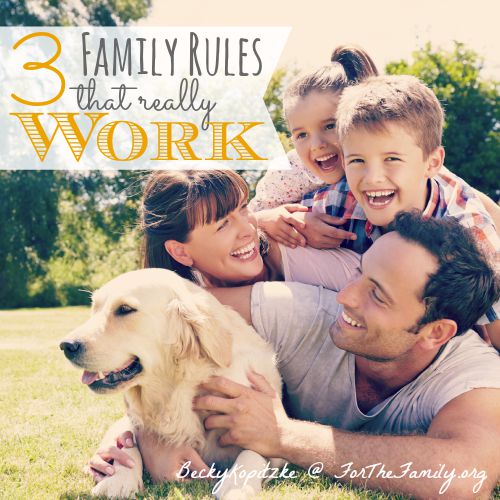Three Family Rules That Work
Don’t hit. Don’t kick. Don’t bite.
Don’t interrupt. Don’t yell at your mother. No calling your sister a poophead.
Pick up your toys, brush your teeth after breakfast, and put on your shoes when I say so—and I really mean it this time.
Ah, family rules. Every household needs them. As soon as the baby learns to spit out peas, we parents learn to say “no!” Rules are a natural part of training and protecting our children.
But they can get a little out of hand.
Early in our parenting career, my husband and I established new rules according to whatever latest boundaries our kids discovered and tested. They leapt off the sofa; we said no jumping on the furniture. They begged for marshmallows; we explained no treats for breakfast. They disagreed with bedtime; we said no escaping after lights out.
Eventually we had so many rules that our kids couldn’t remember them all—and neither could we.
Until one day a friend told us about her three-rule system. And it changed our lives.
The concept is simple. Concentrate on three core family rules, which everyone can remember. But make those rules broad enough so that nearly every behavior is encompassed within.
Here are our three:
1. Obey the first time.
Delayed obedience is disobedience. God expects us to obey him, and one of the ways we obey God is by obeying the people he put in charge of us—namely, Mom and Dad. So, kids, when we tell you to wash hands for dinner, do it. When we tell you to put socks in the hamper, do it. These aren’t individual rules but rather an overall expectation to obey the first time. (For kids younger than age three, try using the words “obey fast.”)
And why do we obey? Not just because we should. But because we want to. Obedience is an expression of love for the One who made the rules in the first place.
“If you love me, you will obey what I command” (John 14:15, NIV).
2. No sassy talk.
I have two little girls, so the term “sassy” suits us. You could say “no back talk” or “no disrespectful talk.” The concept is the same. Don’t let any words, body language, or facial expressions escape your personal space that could possibly show disrespect for Mom and Dad. That includes talking back, rolling eyes, and about a dozen different inflections of the word “whatever.”
“Let your conversation be always full of grace, seasoned with salt, so that you may know how to answer everyone” (Colossians 4:6, NIV).
3. No hurting someone on purpose.
You know what I love about this rule? It covers every kind of hurt—physical and emotional. No more specifying a hundred harmful actions such as kicking, biting, hitting, tripping, name-calling, belittling, ignoring and so on. Basically, if your behavior is meant to hurt somebody, it’s not allowed.
“Get rid of all bitterness, rage and anger, brawling and slander, along with every form of malice. Be kind and compassionate to one another, forgiving each other, just as in Christ God forgave you” (Ephesians 4:31–32, NIV).
Also, the term “on purpose” helps differentiate between intentional behavior and accidents. We have a lot of grace for accidents in our house. If you didn’t mean to whack your sister in the head while you were dancing in the living room, an apology is still in order. But since we Kopitzkes freely encourage dancing, nobody actually broke a rule.
Now I know I said this was a three-rule system, but in our family we do have one more overarching “rule.”
Always show love.
That’s God’s rule, too. So if you really want to simplify, make yours a one-rule household. After all, love covers over a multitude of sins.
“And over all these virtues put on love, which binds them all together in perfect unity” (Colossians 3:14, NIV).
Blessings,
Becky








I love these rules! I have 3, 3 and under, and we all need a lot of love and patience! Can I ask though, how do you enforce obey the first time? I end up yelling a lot at my 3 year olds, because I am nursing the baby, changing the diaper, or simply don’t want to get up, go into the other room and follow up. My girls don’t listen the first time because I’m multitasking… advice and prayers appreciated.
Very good question, Ashley! Enforcement and consequences can be a touchy subject since every family has different convictions. When my friend told me about the three rules, she said she uses checkmarks to keep track of each time a rule is broken. The checkmark is in itself a type of punishment as well as a training tool to help kids understand what type of behavior is associated with each rule (because we always want to make sure we’re training and not just punishing). Then after three checkmarks, a more significant consequence is warranted. For my friend is was spanking. (She only had to use it rarely because the training/checkmarks worked so well.) For us I found it was more effective to take away a prized toy. Then the next day, the toy was returned and the checkmarks were wiped clean for a fresh start because God’s mercies are new every morning! Blessings!
Thank you for this advice. I will pass it on to my children who are raising young children.
In young children, what do you do when a fit follows enforcing one of the rules; or worse yet, you are ignored.
Hi, Kristy. Great question – and this happens to me all the time! My five-year-old has always been the child who rebels against discipline. I can only tell you what has worked for me. I find the one thing that will impact her (taking away a favorite toy) and wait for the fit to pass. I usually tell my girls to go to their rooms and talk to Jesus until they’ve settled down. There’s no point in trying to reason with them when they’re in a tizzy. Or if they ignore me, then I know the punishment wasn’t the right fit. I have to find something that will affect and motivate them. Then afterwards, when they’ve calmed down, we talk about the choice they made. Disobedience is always about choices. “What did you do that was naughty? Did you know this was wrong, yet you did it anyway? What would have been the better choice?” I’ve found that my children really do want a good relationship with me, and they hurt when they’re rebelling. Eventually they will feel remorse and be open to discussing how making a better choice can prevent a rift between us.